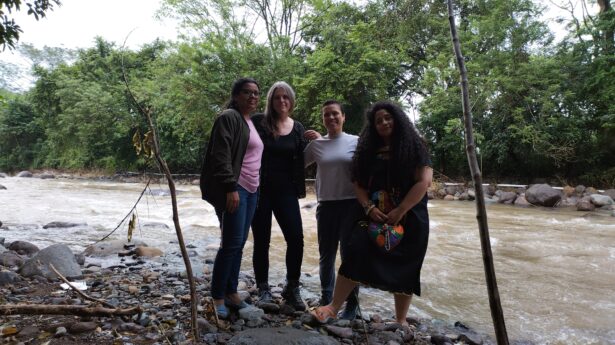The Unitarian Universalist Service Committee advances human rights through grassroots collaborations.
May 13, 2017, Rights Reading

By Kale Connerty on May 13, 2017
Our weekly roundup of what we’re reading: a few select articles from the front lines of human rights that we don’t want you to miss. This week’s Rights Reading highlights articles on sanctuary, sustainability, and the Paris Agreement.

One of the hallmarks of white privilege is the option to be uninformed on and indifferent towards issues of oppression. In the name of “civility” and a backwards sense of fairness, the media has been giving white supremacists a platform on television to express their hate speech. However, this show at fairness actually undermines the platform of people of color fighting for true equality, giving them less airtime and raising white supremacists’ “concerns” to the same level as the concerns of those who are actually oppressed. Whether it’s in an effort towards equal airtime or boosting viewership, the media and white moderates’ uninvolved attitude thus promotes a more passive sense of fairness than an active move towards justice.
Moosa makes a strong argument for how the disaffected white majority can be even more harmful than hate groups. Just because white supremacists can make themselves look presentable and can express their views in a civil manner does not make their rhetoric valid or worthy of a platform in mainstream media.
Trump has called for a crackdown on undocumented immigrants, pushing for law enforcement everywhere to report even the smallest of misdemeanors to the U.S. Immigration and Customs Enforcement (ICE). This is just one example of the alarming move towards the criminalization of marginalized communities that has been happening under the Trump administration.
“Sanctuary” is a term being used a lot lately, but it doesn’t just have to apply to cities. Communities all across the United States can engage in sanctuary practices to protect immigrants. There are many ways that individuals can get involved, such as coming together to push sanctuary laws, going with immigrants to ICE check-ins, staying vigilant and spreading the word about potential ICE raids, and working with grassroots organizations to advocate for immigrant rights.
UUSC recently called on Massachusetts to pass legislation that would would end “287(g) agreements” whereby local law enforcement personnel are authorized to perform a variety of federal immigration enforcement functions, including questioning people about their immigration status, arresting them for immigration violations, and place them in deportation proceedings. Read the press release here.
You can also read our Expanded Sanctuary blog series to learn more.
Yet again, Trump’s meeting with advisers to discuss the United States’ involvement in the Paris Agreement has been postponed. His advisers are in disagreement on this issue. Trump is expected to make a decision soon on whether the United States will withdraw from the Paris Agreement, a potential step that is being condemned worldwide.
During his election campaign, Trump stated his intent to withdraw the U.S. from the climate deal. Already under his administration, we have seen an increase in policies and government appointments that favor big business interests over the safety of the environment and the public. Withdrawing from the Paris Agreement is a dangerous step in the wrong direction for environmental policy and foreign relations. UUSC is watching the White House closely for further developments. Read our latest statement on Trump’s “Energy Independence” Executive Order.
Do you know the environmental footprint for what you’re wearing right now? It’s probably larger than you think. The process to manufacture and distribute clothing requires a high amount of energy and resources. While often overlooked, the fashion industry is one of the leading contributors to environmental pollution and resource depletion in the world.
Selvin discusses pioneering new biotechnologies to cut down on the environmental cost of fashion, but it isn’t just manufacturers who need to think more sustainably. Consumers need to be conscience of what they’re really buying, and how much. Cutting down on how many new clothes you buy and making sure that that your clothing is sustainably sourced are two great ways to reduce your personal environmental footprint.

